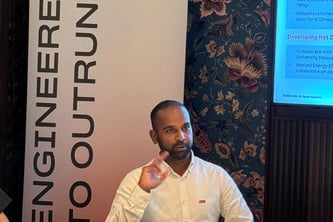Driving Sustainable Energy Solutions in Malaysia
At the recent media iftar event 2025, ABB's VP Abhinav Harikumar discussed how advanced technologies and partnerships are shaping Malaysia's journey toward sustainable energy solutions. Insights were shared in a follow-up Q&A session.
3/19/20252 min read




Q: What role is ABB playing in Malaysia’s energy transition, and how does ABB support renewable energy adoption?
A: Energy transition is not going to happen overnight—it’s complex and progressive. At ABB, we believe no single party can do it alone. Our role is to integrate innovative technologies to build low-carbon energy systems. We collaborate with industry experts to identify and scale high-value technologies.
We signed an MoU with MGTC to initiate the National Energy Efficiency Collaboration (NEEC), which supports Malaysia’s NETR and NEP. Through this initiative, we advocate for enhanced energy efficiency standards and support retrofitting efforts in public and government buildings. We’re also engaging with regulators, energy providers, and end users to accelerate efficiency efforts.
Key projects include the Batang Ai hydro plant, the PFLNG2 floating LNG facility, Malaysia’s largest crude oil refinery in Melaka, and thiochemical plants in Kerteh.
Q: How do automation, AI, and smart grids contribute to energy efficiency and sustainability in Malaysia?
A: Our focus is on technologies in automation, digitalisation, and electrification to create decarbonized systems. Our solutions drive production efficiency, reduce energy waste, and enhance predictive maintenance. Through collaboration with Microsoft, we launched ABB Ability™ Genix Copilot to provide intuitive, AI-driven insights that enhance productivity and sustainability.
Digital tools are also helping Malaysia through remote monitoring at hydro plants and cybersecurity improvements to OT systems. These advancements reduce downtime and improve safety and efficiency.
Q: What are the biggest challenges Malaysia faces in its shift toward renewables and electrification?
A: Balancing energy demand and sustainability is a major challenge. ASEAN’s energy demand may triple by 2050. At the same time, Malaysia and the region must reduce greenhouse gas emissions.
Another challenge is workforce readiness. The transition to renewables requires reskilling and upskilling. ABB is investing in talent development through university partnerships and collaborative symposia.
Finally, scaling Carbon Capture, Utilization and Storage (CCUS) is key. The Asia-Pacific holds immense CCUS potential, and ABB’s CCS 360 solution supports this by enabling modeling, planning, and optimization.
Malaysia’s energy transition must be multi-faceted, and ABB is committed to enabling this journey through innovation, collaboration, and capacity building.
Q: How does ABB view Malaysia’s commitment to net zero carbon emissions?
A: ABB applauds Malaysia's commitment, as outlined in the National Energy Roadmap (NETR), and sees a significant opportunity to reduce emissions and improve operations by integrating greener energy solutions.
Disclaimer
© 2025. All rights reserved.
